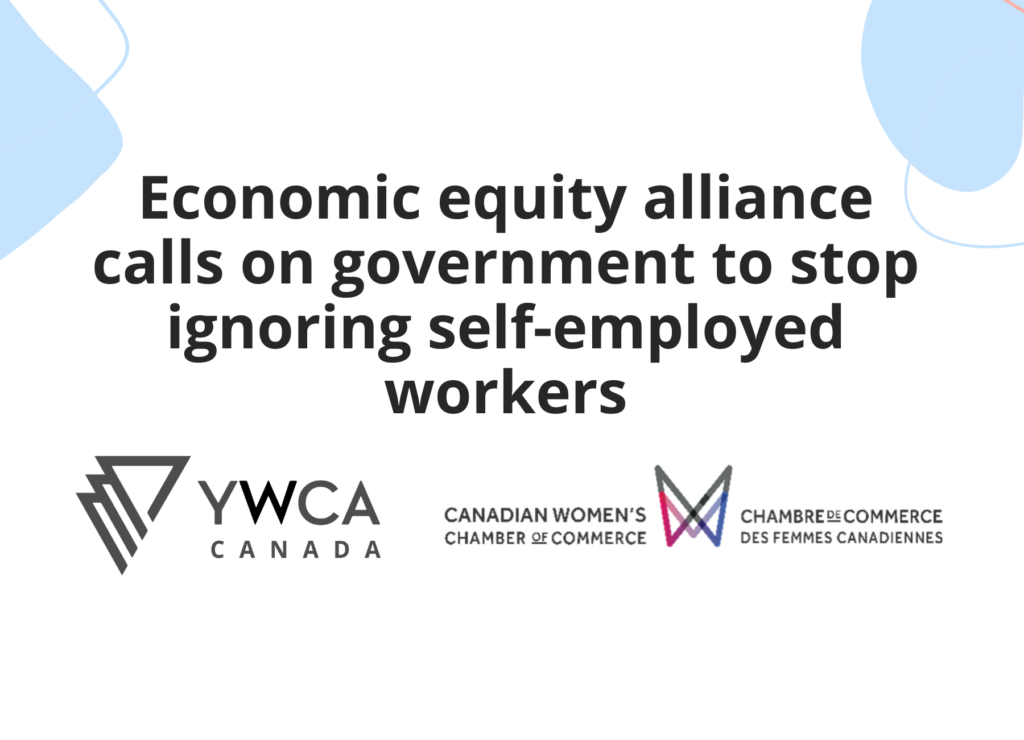[TORONTO, ON. March 18, 2024] – Today, the Economic Equity Alliance (the Alliance) released a groundbreaking report titled “Invisible Entrepreneurs: The Impact of Small Business Policy Neglect on Self-Employed Individuals,” calling on the government to address the longstanding exclusion of self-employed workers from small business policy. The report highlights the urgent need for policymakers to recognize and support this essential segment of the labour market.
The report defines self-employed as someone who earns business or professional income (distinct from employment income) and has no employees (paid or unpaid).
“For too long, economic development discussions have focused on employers and salaried workers, while self-employed workers have been ignored,” says Nancy Wilson, CEO, Canadian Women’s Chamber of Commerce, and a founding member of the Alliance. “It’s time to recognize self-employed individuals as employers of one and acknowledge their economic contribution in providing goods and services to each other, the public, and small and medium-sized businesses.”
The Alliance unites 12 organizations spanning chambers of commerce, trade unions, and community groups with one goal: to shed light on the ongoing neglect of self-employed workers by policymakers. This neglect is evident through various programs that exclude self-employed individuals from accessing critical resources.
- Canada Job Grant: The program offers a non-repayable grant of up to $10k for job-specific training. However, owners are not allowed to take the the course and the program is not open to self-employed individuals.
- Canada Emergency Business Account (CEBA): During COVID-19, the CEBA loans were initially only available to businesses with a minimum 2019 payroll spend. Only after months of external pressure did the Federal government create an additional eligibility scheme for business owners without employees.
- Canada Digital Adoption Plan (CDAP): The $4 billion program offers grants and loans to businesses for technology adoption. To be eligible, businesses must have at least one employee.
In addition, the report highlights how promises for a comprehensive EI plan to cover self-employed freelancers, independent contractors and “gig” workers have been on the table for many years with no action.
“Bringing chambers of commerce and trade unions together in a common cause may not be conventional, but the long-standing neglect of the self-employed demands our collective action,” says Nora Loreto, President, Canadian Freelance Union-Unifor. “Whether they call themselves entrepreneurs, artists, freelancers, or gig workers it’s time to prioritize their needs and provide the necessary support.”
Systemic Gender and Race Discrimination
According to the Alliance, the lack of support for self-employed workers stems from systemic gender and race discrimination.
The report found that equity-deserving groups are disproportionately represented in self-employment:
- 10% of the Canadian labour force are self-employed
- 25% of all self-employed individuals are people of colour
- 18% of rural individuals living in rural Canada are self-employed
- 80% of women entrepreneurs are self-employed
- 50% of Black and 68% of Indigenous entrepreneurs are self-employed
“For many marginalized individuals, self-employment is more than just a platform for pursuing innovative ideas beyond traditional employment,” says Navya Baradi, Executive Director, National Collective of Women in Business. “It is a necessity fueled by various intersecting barriers like gender, race, geographical location, and socio-economic context. It is critical that we ensure equitable opportunities, support, and resources are available to support these individuals in their pursuit of self-employment.”
Recommendations
To address these pressing issues and create a more equitable opportunity for all entrepreneurs, the Economic Equity Alliance presents a set of recommendations:
- Provide social policy to support the self-employed by:
- Expanding universal pharmacare as quickly as possible and expanding dental care
- Fulfilling the promise of EI reform for self-employed individuals
- Fund a national summit on self-employment that will discuss the key issues facing the self-employed to find solutions to problems of isolation, and lack of social and economic supports.
- Ensure that all improvements made to policies that impact self-employed workers are done through the lens of resolving gender and race-based inequity.
The Report also includes recommendations from six regional focus groups that were held with self-employed individuals to gather information about the participants’ experiences, needs, and challenges. These include: income tax reform for T1 business and professional income and funding for organizations and projects that support self-employed Canadians.
The full report and recommendations can be found here.
Funded by a grant from the Department of Women & Gender Equality under the
Feminist Response and Recovery Fund, the Economic Equity Alliance was initiated by the Canadian Women’s Chamber of Commerce in January 2023 to bring together organizations representing the interests of solo entrepreneurs and self-employed individuals.
Economic Equity Alliance Members:
Black Business and Professional Association, Canadian Women’s Chamber of Commerce, The Canadian Arts Coalition, The Canadian Freelance Union (Unifor), The Canadian Labour Congress, The Canadian Rural Revitalization Foundation, Innovators & Entrepreneurs Foundation, LiisBeth, The National Collective of Women in Business, Rise, Up With Women/Exponenti’elles, YWCA Canada
-30-
About CanWCC:
The Canadian Women’s Chamber of Commerce (CanWCC) is a nationally incorporated, not-for-profit organization dedicated to advocacy, advancement, and connection for and on behalf of its members. CanWCC’s membership consists of diverse women-identified entrepreneurs and organizations that are at least 50% woman(en)-owned and led.
Media Contact:
Aliya Jiwan-Thawer
416-999-3355
